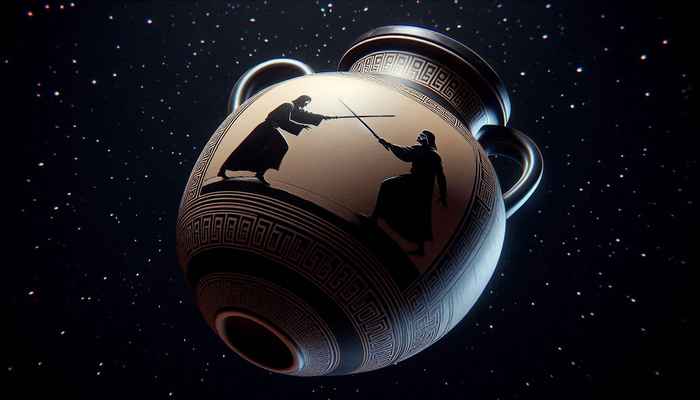From the Iliad to Iron Man: the two-way influence between ancient and modern epics
1 July 2025

In his thesis, Vacano explores how today’s most popular films not only echo classical epics like The Iliad and The Aeneid but also change how we interpret those ancient texts. ‘My research started out by asking what the “epic” of our time is,’ says Vacano. ‘Some claim the epic no longer exists, but that’s simply not true. Today’s fantasy films are long, sweeping narratives about heroes performing monumental deeds - just like in Homer or Virgil. They deal with good and evil, feature battles and quests, and stir audiences emotionally, much like ancient epics surely did for their listeners.’
The influence of the ancients
Vacano found that a glimpse behind the curtain of modern Hollywood very quickly reveals the influence of the ancients. Aristotle’s work on drama and epics – Poetics - is universally taught in screenwriting classes, as is the work of mythologist Joseph Campbell and his “Hero’s journey”.
‘Campbell talks about a universal story structure pattern emerging from ancient myths that has come to serve as a kind of ideal screenwriting paradigm today. So these two key building blocks of modern-day popular storytelling go back to classical antiquity,’ says Vacano.

We now look at Homer and Virgil through the lens of Star Wars, not the other way around.
Through the lens of Star Wars
But central to Vacano’s thesis is the idea of a two-way street of influence, where modern storytelling paradigms, born of the ancients, change the way we understand those original texts. ‘The Hero’s Journey is an interesting case, because although it draws on the stories of antiquity, its assertion that every epic should have a central hero, is not always borne out in the ancient texts,’ says Vacano. ‘In the Iliad, Achilles is a central figure, but Hector is equally heroic. The idea that every epic revolves around one main hero is actually a modern reading shaped by today’s storytelling norms. We now look at Homer and Virgil through the lens of Star Wars, not the other way around.’
Sequels and spin-offs
Vacano also explores the modern cinematic/televisual obsession with ‘world-building’ - a trait often considered unique to contemporary franchises, with sequels and spin-offs proliferating from successful products. However, Vacano argues, the epics of antiquity actually functioned in similarly expansive ways. ‘The Odyssey is, in effect, a sequel to the Iliad. Virgil’s Aeneid is a kind of Roman spin-off from Homer’s universe.’
Flourishing in new formats
So, far from being stuck in the past, the epic is in rude health and continuously evolving. Vacano discusses how epic storytelling is now flourishing in new formats - streaming series, video games and global cinema. Rather than merely reviving antiquity, these modern epics are generating fresh narratives with worldwide resonance.
‘The epic has become global and digital. It’s no longer confined to classical antiquity or the printed page. Today’s epic is a Marvel film, an anime series, or a video game,’ says Vacano. ‘But this isn’t a return to the past - it’s a new kind of epic entirely, built on the foundations of both classical myth and modern fantasy.’